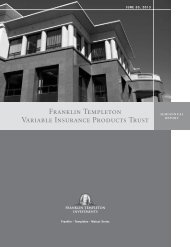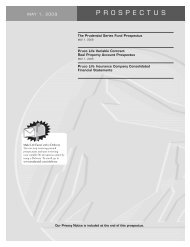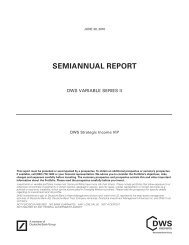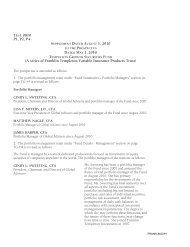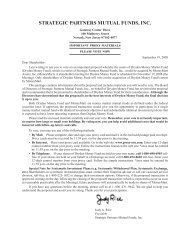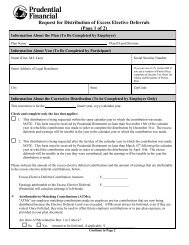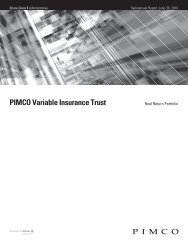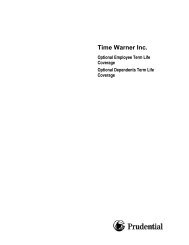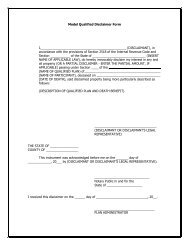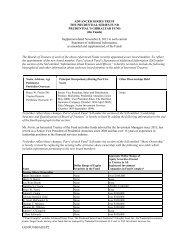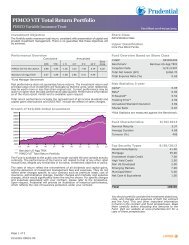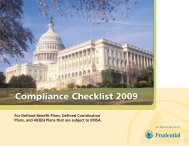The Prudential Series Fund
The Prudential Series Fund
The Prudential Series Fund
You also want an ePaper? Increase the reach of your titles
YUMPU automatically turns print PDFs into web optimized ePapers that Google loves.
General Risks of Real Property Investments<br />
By participating in the Real Property Account and thereby in the investment performance of the Partnership, you will<br />
be subject to many of the risks of real property investments. <strong>The</strong>se include:<br />
1. Risks of Ownership of Real Properties. <strong>The</strong> Partnership will be subject to the risks inherent in the ownership of<br />
real property such as fluctuations in occupancy rates and operating expenses and variations in rental schedules. It<br />
may be adversely affected by general and local economic conditions, the supply of and demand for properties of the<br />
type in which the Partnership invests, zoning laws, and real property tax rates. Operation of property in which the<br />
Partnership invests will primarily involve rental of that property to tenants. <strong>The</strong> financial failure of a tenant resulting in<br />
the termination of their lease might cause a reduction in the cash flow to the Partnership. If a lease is terminated,<br />
there is no assurance that the Partnership will be able to find a new tenant for the property on terms as favorable to<br />
the Partnership as those from the prior tenant. Investments in hotels are subject to additional risk from the daily<br />
turnover and fluctuating occupancy rates of hotel rooms and the absence of long-term tenants.<br />
<strong>The</strong> Partnership's properties will also be subject to the risk of loss due to certain types of property damage (such as<br />
from nuclear power plant accidents and wars), which are either uninsurable or not economically insurable.<br />
2. Risks of Mortgage Loan Investments. <strong>The</strong> Partnership's mortgage loan investments will be subject to the risk of<br />
default by the borrowers. In this event the Partnership would have the added responsibility of foreclosing on or<br />
pursuing other remedies on the underlying properties to protect the value of its mortgage loans. A borrower's ability to<br />
meet its mortgage loan payments will be dependent upon the risks generally inherent to the ownership of real property.<br />
Mortgage loans made by the Partnership will generally not be personal obligations of the borrowers. <strong>The</strong> Partnership<br />
will only rely on the value of the underlying property for its security. Mechanics', material men's, government, and<br />
other liens may have or obtain priority over the Partnership's security interest in the property.<br />
In addition, the Partnership's mortgage loan investments will be subject to prepayment risks. If the terms of the<br />
mortgage loans permit, mortgagors may prepay the loans, thus possibly changing the Partnership's return.<br />
Junior mortgage loans (including wraparound mortgage loans) will be subject to greater risk than first mortgage loans,<br />
since they will be subordinate to liens of senior mortgagees. In the event a default occurs on a senior mortgage, the<br />
Partnership may be required to make payments or take other actions to cure the default (if it has the right to do so) in<br />
order to prevent foreclosure on the senior mortgage and possible loss of all or portions of the Partnership's investment.<br />
"Due on sale" clauses included in some senior mortgages, accelerating the amount due under the senior mortgage in<br />
the case of sale of the property, may be applied to the sale of the property upon foreclosure by the Partnership of its<br />
junior mortgage loan.<br />
<strong>The</strong> risk of lending on real estate increases as the proportion, which the amount of the mortgage loan bears to the fair<br />
market value of the real estate increases. <strong>The</strong> Partnership usually does not make mortgage loans of over 80% of the<br />
estimated or appraised value of the property that secures the loan. <strong>The</strong>re can be no assurance, that in the event of a<br />
default, the Partnership will realize an amount equal to the estimated or appraised value of the property on which a<br />
mortgage loan was made.<br />
Mortgage loans made by the Partnership may be subject to state usury laws. <strong>The</strong>se laws impose limits on interest<br />
charges and possible penalties for violation of those limits, including restitution of excess interest, unenforceability of<br />
debt, and treble damages. <strong>The</strong> Partnership does not intend to make mortgage loans at usurious rates of interest.<br />
Uncertainties in determining the legality of interest rates and other borrowing charges under some statutes could result<br />
in inadvertent violations, in which case the Partnership could incur the penalties mentioned above.<br />
3. Risks with Participations. <strong>The</strong> Partnership may seek to invest in mortgage loans and Leasebacks with<br />
Participations, which will provide the Partnership with both fixed interest and additional interest based upon gross<br />
revenues, sale proceeds, and/or other variable amounts. If the interest income received by the Partnership is based,<br />
in part, on a percentage of the gross revenues or sale proceeds of the underlying property, the Partnership's income<br />
will depend on the success in the leasing of the underlying property, the management and operation of such property<br />
by the borrower or lessee and upon the market value of the property upon ultimate disposition. If the Partnership<br />
negotiates a mortgage loan with a lower fixed interest rate and an additional percentage of the gross revenues or<br />
eventual sale proceeds of the underlying property, and the underlying property fails to generate increased revenues or<br />
to appreciate, the Partnership will have foregone a potentially greater fixed return without receiving the benefit of<br />
appreciation. State laws may limit Participations. In the event of the borrower’s bankruptcy, it is possible that as a<br />
result of the Partnership's interest in the gross revenues or sale proceeds, a court could treat the Partnership as a<br />
partner or joint venturer with the borrower, and the Partnership could lose the priority its security interest would have<br />
been given, or be liable for the borrower’s debts. <strong>The</strong> Partnership will structure its Participations to avoid being<br />
characterized as a partner or joint venturer with the borrower.<br />
10 - Real Property



